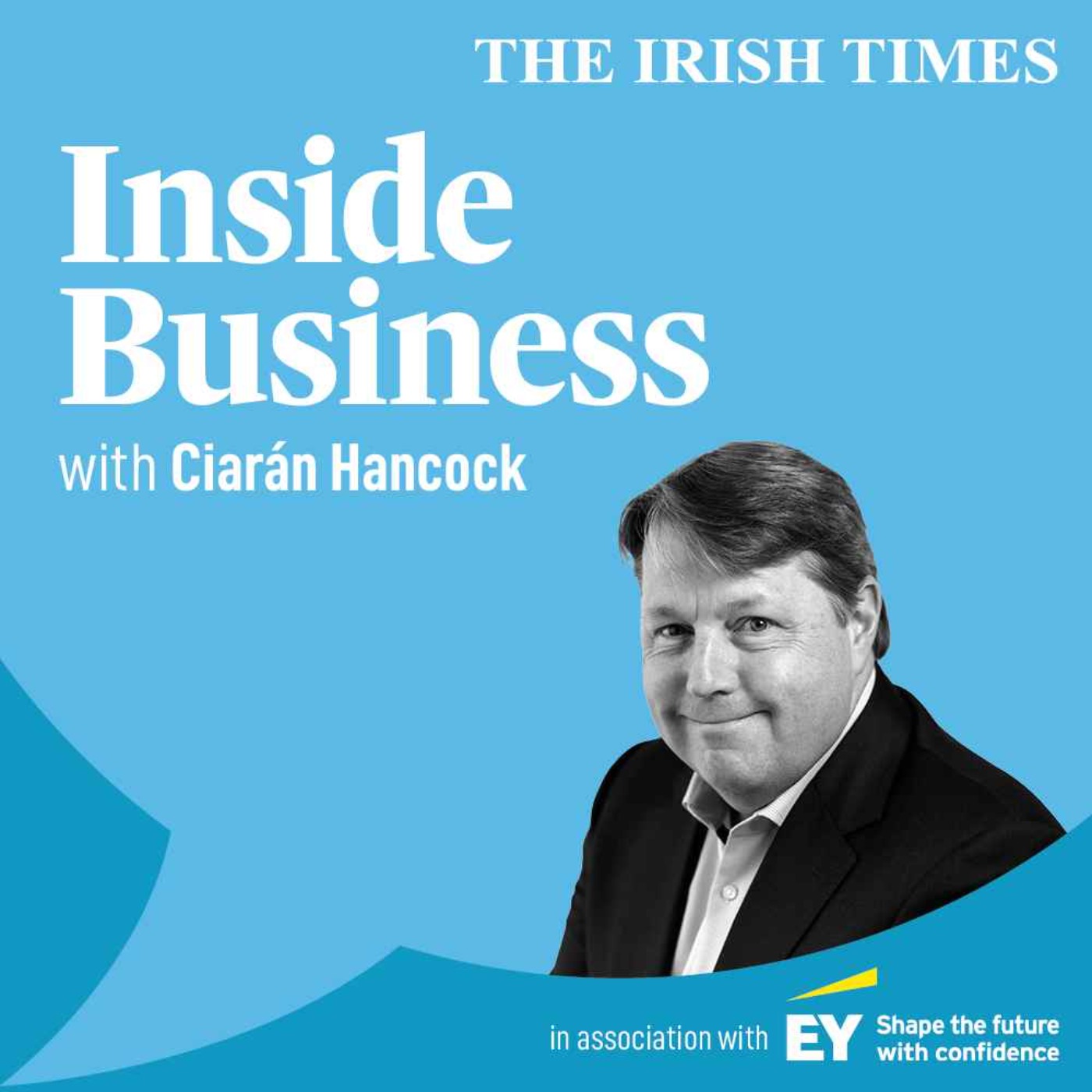The NFL comes to Dublin: How it became the richest sports league in the world
Listen | 26:19

Read more on post.
The Government has been warned to scale back spending or risk overheating the economy.
In its latest quarterly bulletin, the Economic and Social Research Institute (ESRI) said the Government’s fiscal stance, including the proposed €9.4 billion budget for next year, was adding to demand pressures at the wrong time in the economic cycle.
This could be damaging in the long-term “if capacity constraints or cost inflation” prevent the full delivery of the National Development Plan (NDP), it said. Eoin Burke-Kennedy reports.
Eoin also tells us that the Government’s housing targets will not be met this year or next, the Economic Social and Research Institute (ESRI) has warned.
The think tank predicted house completions would rise to 35,000 this year after a better-than-expected outturn in the second quarter.
Moves by the Trump administration to force pharmaceutical companies to lower drug prices in the United States would dramatically lower Irish corporation tax receipts, new research has warned.
However, the impact would not feed through to the exchequer until at least 2027, as corporation tax is paid a year in arrears. Dominic Coyle reports
Listen | 26:19
C&C Group, the drinks company behind Bulmers and Tennent’s, faces limited sales growth over the medium term if it does not carry out mergers and acquisitions (M&A) to boost its stable of brands, according to analysts in a new report from RBC Capital Markets.
A “leading premium or craft” drinks brand deal, priced in the order of £200 million, would make more sense than targeting a key brand in the UK, RBC analyst Tania Maciver suggested in the report. A transaction of that size would equate to almost 40 per cent of C&C’s current market value. Joe Brennan reports.
The loss of 520 units in the retail and wholesale sector was the main driver as the rate of empty commercial properties across the State climbed to a record high of 14.6 per cent in the second quarter, new data shows.
A total of 30,800 commercial units were classified as vacant in buildings data group GeoDirectory’s latest commercial vacancy rates report. The analysis, prepared by EY, found the rate increased in 17 out of 26 counties compared with a year earlier. Colin Gleeson reports.
Countries are increasingly looking to retain control over sensitive data rather than leave it in the hands of private operators driven by profit. So should Ireland have its own sovereign AI? Ciara O’Brien reports.
Resident sage Cantillon notes that Bank of Ireland’s technology has been listed by Autonomous, the international financial sector research firm (owned by AllianceBernstein), as up there with the best in Europe. Cantillon also notes that efforts by Spanish lender BBVA to create Europe’s third-biggest lender appear to be coming to a head. And finally, our sage sees Aer Lingus blotting its copybook in the key US market.
The cyber security incident in Dublin Airport at the weekend was for air travel passengers, but the world we live and work in today is heavily reliant on invisible companies. That’s not a bad thing. An awful lot of the work these companies do is incredibly boring, despite being vital to basic day-to-day activities.
Improving oversight on important boring work is the only way to reduce such incidents in the future, argues Emmet Ryan in his column.
While motorists are becoming more used to the idea that electric vehicles are here to stay, there is still an element of consumer unease about buying one. The range anxiety issue has largely been addressed. What hasn’t is battery life and exactly how this piece of the puzzle works, especially when it comes to trading in and valuing a vehicle for the used car market.
Olan O’Sullivan cofounded BatteryCycle with Professor Fabiano Pallonetto last year to plug this battery evidence gap. Olive Keogh spoke to him.
Apple’s AirPods Pro 3 brings all the things you liked about the original buds and a few you may never have used – active noise cancelling, spatial awareness, conversational awareness to dip your audio – with some new technology wrapped inside, writes Ciara O’Brien in her review.
Green energy business Galetech Group has bought 50 per cent of wind turbine repair specialist, Blade Technical Services (BTS), the company confirmed on Tuesday.
Co Cavan-based Galetech employs 130 people in providing technical advice, project management, maintenance and other services to wind, solar and energy storage firms. Barry O’Halloran reports
If you’d like to read more about the issues that affect your finances, try signing up to On the Money, the weekly newsletter from our personal finance team, which will be issued every Friday to Irish Times subscribers.
Read full article on post.
(This article is produced by our Gaeltacht team. You can read the English version here. )
TAR ÉIS GUR tugadh chun solais go bhfuair an líon is mó riamh daltaí meánscoile diolúintí ó staidéar na Gaeilge i gclár faisnéise TG4, rinne urlabhraí ón Roinn Oideachais agus Óige cosaint ar an gcóras ag rá gur i gcásanna éisceachtúla amháin a cheadaítear diolúine ach gur gá féachaint ar an scéal i “comhthéacs níos leithne”.
San eagrán de chuid Iniúchadh TG4/TG4 Investigates a craoladh aréir, tugadh chun solais go raibh 60,946 dalta iar bhunoideachais – nó 14.3% den líon iomlán – tar éis diolúintí a fháil ó staidéar na Gaeilge don scoilbhliain 2024/25.
Méadú de bhreis is 5,000 é seo ar líon na ndiolúintí a tugadh amach do 2023/24 agus is dúbailt é, nach mór, ar an méid diolúintí a tugadh amach seacht mbliana ó shin.
I bhfreagra ón Roinn Oideachais agus Óige ar an scéal seo, dúirt urlabhraí gur i gcásanna éascaachtúla ar leith a tugtar diolúintí do dhaltaí a ligeann dóibh gan staidéar a dhéanamh ar an teanga.
“Ní mór féachaint ar líon na ndiolúintí ar staidéar na Gaeilge i gcomhthéacs níos leithne,” dúirt urlabhraí na Roinne.
“Tá líon an gclárú ag leibhéal an iar bhun oideachais tar éis méadú ó 362,899 i 2018/19 go dtí 425,411 in 2024/25 agus is ionann sin agus méadú 17%.
“Tá breis is 18,000 dalta ón Úcráin tar éis clárú, 11,267 ag an mbunleibhéal agus 6,946 sa chóras iar bhunoideachais.
“Tá ardú ag teacht ar líon na bpáistí le riachtanais oideachais speisialta atá coimpléacsach agus is fianaise ar seo go bhfuil beagnach 1700 rang speisialta nua á sholáthar sa chóras oideachais agus go bhfuil clárúcháin scoileanna speisialta arduithe 300 gach bliain.”
Dúradh sa ráiteas ón Roinn Oideachais agus Óige go raibh beagnach 28.000 dalta le riachtanais oideachais speisialta i ranganna speisialta nó i scoileanna speisialta sa scoil bhliain 2024/25.
“Is ionann seo agus beagnach 3% de dhaonra iomlán na ndaltaí atá ag freastal ar bhunscoileanna agus iar bhunscoileanna ar fud na tíre,” arsa urlabhraí na Roinne.
Tá duine de cheannairí Aontas Daltaí Iar-Bhunscoile na hÉireann, Rónán Ó hIcí, Oifigeach na Gaeilge leis an eagras, den tuairim go bhfuil an Roinn Oideachais ag ligean síos na ndaltaí a fhaigheann díolúine mar nach bhfuil aon phlean straitéiseach acu chun an scéal a fheabhsú.
“Is teip atá i gceist leis an gcaoi go gcaitear leis an nGaeilge sa chóras oideachais i láthair na huaire, agus is iad na díolúintí toradh na teipe seo,” dúirt sé le The Journal.
“Is é ár n-éileamh ná chun polasaí cuimsitheach don nGaeilge ón luathoideachas go dtí an tríú leibhéal, bunaithe ar an bhFráma Tagartha Comónta Eorpach, curaclam a léiríonn go bhfuil an Ghaeilge ann do chách – bíodh sin gur inimirceach tú, gur pháiste le riachtanais speisialta tú, nó gur cainteoir dúchais thú.”
Dar le hÓ hIcí, ba cheart go mbeadh an córas níos solúbtha ná mar atá agus go mbeadh rogha ag daltaí tabhairt faoin teanga a fhoghlaim trí chóras Teastas Eorpach na Gaeilge atá mar chuid den Fhráma Tagartha Comónta Eorpach. Thabharfadh sin deis dóibh Gaeilge a fhoghlaim mar theanga chumarsáide agus, le cois, thabharfadh sé cáillíocht atá aitheanta ar fud na hEorpa dóibh freisin.
Dúradh freisin sa ráiteas ón Roinn Oideachais agus Óige go raibh obair ar bun sa Roinn ar pholasaí nua a fhorbairt ar oideachas trí mheán na Gaeilge agus go mbeadh seo á fhoilsiú, ag brath ar bheannú an Aire an Fhómhair seo.
“Tá críoch á chur ar phlean gnímh don Ghaeilge i scoileanna a fheidhmíonn trí Bhéarla faoi láthair agus tá súil go bhfoilseofar é, ag brath ar bheannacht an Aire a bheith faighte aige, an Fhómhair seo, agus go mbeadh sé curtha i bhfeidhm idir seo agus Meán Fómhair 2027.
Luadh beartais eile i measc tacaíocht bhreise d’oideachas trí mheán na Gaeilge agus don Ghaeilge mar ábhar atá á ullmhú nó forbartha ag an Roinn. Ina measc tá tacaíocht á thabhairt don Chomhairle Um Oideachais Gaeltachta agus Gaelscolaíochta chun ranganna a chur ar fáil chun scileanna Gaeilge a fheabhsú agus fearas uirlisí chun treoir a thabhairt le haghaidh slite beatha agus roghanna oideachais ard leibhéil le Gaeilge.
Beartas eile a luaigh urlabhraí na Roinne ná maoiniú d’Fhoras na Gaeilge chun an togra Gaelbhratach a chur chun cínn, togra a spreagann scoileanna scéimeanna chun níos mó Gaeilge a úsáid a chur i bhfeidhm. Tá beartais eile ann chun cur le hoiliúint múinteoirí maidir le múineadh na Gaeilge do dhaltaí le riachtanais éagsúla.
Tá tacaíocht á fháil ag Beartas Gaeltachta The Journal ón Scéim Tuairiscithe ar Dhaonláthas Áitiúil

Read full article on post.
Britain’s true national sport is complaining about the weather. But does the Sun really shine brighter everywhere else, or is this quite a green and pleasant land after all?
Compare your location to cities across the world, and find out if you’re forecast to become the BBC’s next star meteorologist.
You can find the latest forecast on the BBC Weather website.
Want to know how Cooler Than Me? works? Read the FAQ.

Read full article on post.

THE GOVERNMENT HAS been urged to adopt a “tightened fiscal stance” in Budget 2026 and has also been criticised for its opposition to the EU-Mercosur trade deal.
In the ESRI’s summer commentary, it was warned that Ireland’s finances may be as vulnerable now as they were in the lead-up to the financial crisis of 2008 because of the government’s reliance on windfall tax revenues from international corporations.
Today’s Autumn statement published by the ESRI has reiterated these concerns.
The ESRI said that once windfall corporation tax receipts had been taken into account, deficits have been running in recent years.
“The windfall nature of a large proportion of Ireland’s corporate tax receipts means that they could vanish quickly,” said the ESRI in its quarterly economic commentary.
“The parallels to the collapse in building-related taxes at the outset of the economic crisis of 2007–2008 are clear,” it added.
As a result, the ESRI has cautioned the government to move towards a surplus, adjusting for the windfall taxes.
The ESRI noted that this would be a “much tighter envelope than envisaged in the Summer Economic Statement”, when the Government provided for a budgetary package worth €9.4 billion.
This would be comprised of a tax package of €1.5 billion and additional spending of €7.9 billion.
It was also remarked that the growth in government spending is more rapid than the ESRI would like in a “robust economy” with a low unemployment rate.
The ESRI added that “stricter fiscal discipline” in Budget 2026 should be accompanied by “more focused resource allocation”, such as additional Child Benefit payments “directed at those in greatest need”.
Earlier this month, a report by the ESRI found that a second tier of child benefit targeting low income households “could lift more than 50,000 children out of poverty”.
Taoiseach Micheál Martin said he was “working” on introducing a second tier of child benefit but added: “There are complexities in terms of getting such a system up in place that we don’t want anyone to lose out.”
Meanwhile, the ESRI said trade-offs will have to be made and “certain activities given priority” to meaningfully address bottlenecks in housing and infrastructure.
While the most recent data indicates an increase in housing output, there are also sustained increases in other construction activity.
The ESRI report states: “As evidenced by the recent rise in construction wages, the sector is unlikely to have the capacity to simultaneously increase housing output substantially, invest in critical infrastructure, and retrofit and renovate the existing housing stock at full employment.”
The Autumn commentary also looked at the government’s stance on the EU-Mercosur trade deal and questioned whether opposition is a “major policy contradiction” at a time when the “promotion of free trade is important for Ireland”.
At the start of the month, the European Commission gave its final go-ahead to a huge trade deal with South American bloc Mercosur, 25 years after negotiations began.
The Mercosur bloc brings together Argentina, Brazil, Paraguay and Uruguay and the agreement is a key pillar in the push by Brussels to open new markets in the face of US tariffs.
However, it has faced stiff opposition from farmers and Ireland is one of the few EU countries not to support the deal.
The ESRI pointed towards a report commissioned by the Department of Enterprise, Trade and Employment in 2021.
According to this report, exports from Ireland to the Mercosur countries were projected to grow by €1.1 billion out to 2035.
And while beef farmers oppose the Mercosur deal, the 2021 report found that the “upper bound estimate was for a fall in beef production of 0.08%”.
However, while the ESRI said the study of the Mercosur deal “shows positive economic outcomes for Ireland”, it acknowledged that “the opposition to the deal is unsurprising”.
The ESRI urged the government to “reflect carefully on its reservations” to the deal.
It added that “those who lose as a result of the deal can be compensated and supported”.
“There might be good reasons why the losses of one group should be weighted disproportionately compared to the gains for others, but it is important to be transparent on this,” said the ESRI.
It added that economic policy should be directed towards protecting and enhancing free trade and that it seems “counterproductive to be opposing free trade agreements”.
Elsewhere, the Autumn commentary noted that the economy continues to perform robustly, with continued growth in household consumption, employment, and tax receipts.
It also noted that the agreement on tariffs between the US and the EU has removed much of the uncertainty that has prevailed in Ireland.
However, the ESRI said the 15% tariff is a “clear deterioration in Ireland’s trading environment relative to previous policy regime” and that this will impact firms and sectors whose exports are most exposed to the US.
There was a major increase in economic output in the first half of the year, particularly in the pharma sector, in an attempt to frontload activity ahead of new US tariffs.
Exports jumped sharply in Q1 before significantly scaling back in Q2.
The ESRI expects exports to grow by 6.1% this year and by 0.9% in 2026.
The ESRI meanwhile noted that there is still uncertainty in the pharma sector as it remains under a section 232 investigation in the US.
On 16 April, the Trump administration initiated new investigations into the imports of pharmaceuticals under Section 232 of the Trade Expansion Act.
The purpose of a Section 232 investigation is to determine the effect of imports on US national security and whether certain imports “threaten to impair” national security.
In the context of pharmaceuticals, the investigation will look at the role of foreign supply chains in supplying the US market and the extent to which domestic US production can meet demand.
A report on the investigation was due to be filed in August but is still outstanding.


Taylor Swift’s new cinema outing generates more than €12million in just 24 hours
European Parliament snubs Orbán with vote to shield Italian MEP from Hungarian arrest


Milan Fashion Week 2025: Unmissable shows and Giorgio Armani in mind


Fintan O’Toole: How can you live with the knowledge that you have facilitated mass murder?


Households to be offered energy bill changes, but unlikely to lead to savings


Marvel stars Mark Ruffalo and Pedro Pascal stand up for Jimmy Kimmel as Disney boycott intensifies


AI Is Pointless If It Doesn’t Boost Productivity
EU renews support for WHO’s Universal Health Coverage Partnership